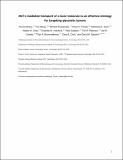MCT1-mediated transport of a toxic molecule is an effective strategy for targeting glycolytic tumors
Author(s)
Birsoy, Kivanc; Wang, Tim; Possemato, Richard; Koch, Catherine E.; Chen, Walter W.; Hutchins, Amanda W.; Gultekin, Yetis; Carette, Jan E.; Brummelkamp, Thijn R.; Clish, Clary; Yilmaz, Omer; Peterson, Timothy Richard; Sabatini, David; ... Show more Show less
DownloadBirsoy.pdf (661.2Kb)
PUBLISHER_POLICY
Publisher Policy
Article is made available in accordance with the publisher's policy and may be subject to US copyright law. Please refer to the publisher's site for terms of use.
Terms of use
Metadata
Show full item recordAbstract
There is increasing evidence that oncogenic transformation modifies the metabolic program of cells. A common alteration is the upregulation of glycolysis, and efforts to target glycolytic enzymes for anticancer therapy are under way. Here, we performed a genome-wide haploid genetic screen to identify resistance mechanisms to 3-bromopyruvate (3-BrPA), a drug candidate that inhibits glycolysis in a poorly understood fashion. We identified the SLC16A1 gene product, MCT1, as the main determinant of 3-BrPA sensitivity. MCT1 is necessary and sufficient for 3-BrPA uptake by cancer cells. Additionally, SLC16A1 mRNA levels are the best predictor of 3-BrPA sensitivity and are most elevated in glycolytic cancer cells. Furthermore, forced MCT1 expression in 3-BrPA–resistant cancer cells sensitizes tumor xenografts to 3-BrPA treatment in vivo. Our results identify a potential biomarker for 3-BrPA sensitivity and provide proof of concept that the selectivity of cancer-expressed transporters can be exploited for delivering toxic molecules to tumors.
Date issued
2012-12Department
Massachusetts Institute of Technology. Department of Biology; Koch Institute for Integrative Cancer Research at MITJournal
Nature Genetics
Publisher
Nature Publishing Group
Citation
Birsoy, Kivanç, Tim Wang, Richard Possemato, Omer H Yilmaz, Catherine E Koch, Walter W Chen, Amanda W Hutchins, et al. MCT1-mediated Transport of a Toxic Molecule Is an Effective Strategy for Targeting Glycolytic Tumors. Nature Genetics 45, no. 1 (December 2, 2012): 104-108.
Version: Author's final manuscript
ISSN
1061-4036
1546-1718